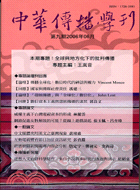 閱覽人數: 662
閱覽人數: 662
June
2006
No. 9
全球與地方化下的批判傳播
Globalization and Local Development in The Context of Critical Communication頁數:71 - 112
作者(中)
林麗雲
作者(英)
Lih-Yun Lin
關鍵詞(中)
威權主義與媒體 ; 電視史 ; 資本形成
關鍵詞(英)
authoritarian rule ; television history ; capital formation
中文摘要
本文分析威權主義下台灣電視資本形成的過程。本文關注的是:台灣無線電視產權裡對立的元素(如官方∕私人資本,大陸∕本省資本,本國∕外資)如何發生衝突,進行協調,達成一致,形成特定的資本結構?本文的分析指出:在台灣威權體制中,統治者把電視當作宣傳的工具,便宜行事,由官方結合特定私人資本,藉由分配資源(包括電視股份)與特定人士與團體(如黨政官僚與私人企業等)發展出保護主與侍從的關係。但因為三台成立的脈絡不同,其保護主與侍從的關係略有不同。在資本結合的過程中,官股與民股有時因利益而發生衝突。但是,在營利的驅力下,雙方由對立朝向合作,共享寡佔下的暴利。基於此分析,本文建議,在無線電視產權轉型之際,電視的股份宜回歸公共。
英文摘要
Of the central concern of this paper is the capital formation in Taiwan's television in the 1960s. It asks: how were the opposite elements of the capital contradicted, negotiated and finally united? This paper answers the problem by looking into the logic of the state under the authoritarian rule. According to the analysis, the party-state mainly conceived television as a governmental propaganda tool, not as a cultural and educational institution, thus declining to invest, and allowing state bureaucrats and private capitals to make extortionate profits. But developed in different contexts, the capital formation of the three stations had slight differences. The official and private shareholders had contradictions and even conflicts; but driven by common interests, they became united. Based on the analysis, this paper suggests that as the private shareholders have long garnered interests, their shares be returned to the public at low cost.